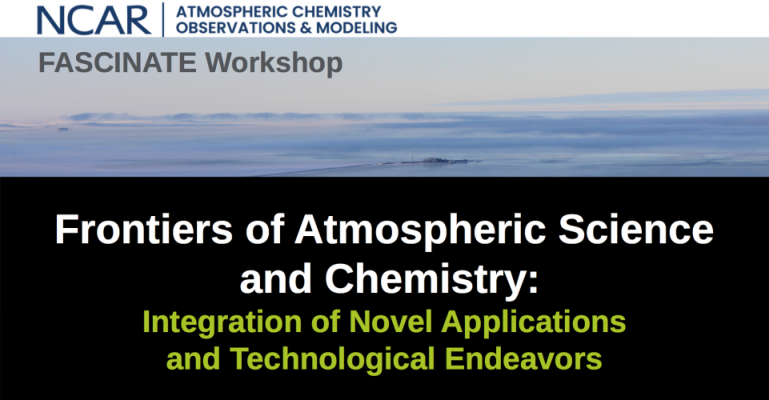FASCINATE 2019
8:00 am – 5:00 pm MDT
CONFERENCE REGISTRATION IS OPEN UNTIL AUGUST 23rd:

Workshop Title: Frontiers of Atmospheric Science and Chemistry: Integration of Novel Applications and Technological Endeavors (FASCINATE)
Dates: September 9th to 11th, 2019
Location: NCAR Center Green Campus in Boulder, Colorado
Optional add-on tutorial covering Python for big-data: September 12th, 2019
Registration Fee: $250 (including breaks, lunches, and a reception, $30 addon for Python tutorial)
Travel Assistance: To apply for travel assistance please fill out the form found under the Abstract Tab
Workshop Goal: Aid in the bi-directional transfer of information among those that are pushing the boundaries of how we think about atmospheric composition and its impacts.
Workshop Outline: We will explore several frontiers that are pushing the boundaries of atmospheric chemistry. Themes include novel uses of satellite data, analysis techniques developed for processing of immense datasets, as well as a discussion of advances in related health impact studies. There will be a special emphasis on techniques and research that bridge the gap between these themes to approach a number of seminar topics, some of which are highlighted below:
Oral Presentation Format: Longer presentations are planned for all of our speakers, where they will present for 20 minutes followed by a 30 minute joint panel discussion with their two co-speakers within a specific topic that is related to the workshop themes to allow for deep synthesis and impactful understanding.
Poster Presentation Format: Workshop attendants will be encouraged to present a poster on their current work, and a 1 minute “lightning” talk to introduce themselves and describe how their work relates to the workshop themes. Prizes will be awarded to the students with best poster and best lightning poster presentation each day.
Optional Python Tutorial (limited space): A full-day interactive Python tutorial applying examples to NCAR-provided data (or your own) is planned to follow the FASCINATE meeting. The morning session will cover an introduction to using Python for atmospheric science applications and will target those not familiar with using the language. The afternoon will introduce machine-learning with Python and will be targeted to those with some experience using Python. Computers will be supplied if needed.
Draft agenda has been posted here.
For any questions or requests for more information please send an email to lacey@ucar.edu